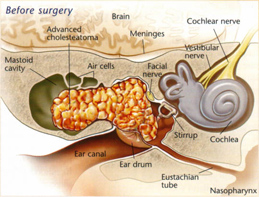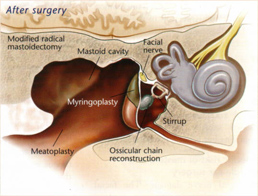 |
|||||||||||||||
|
|
 |
 |
|||||
Mastoidectomy For Cholesteatoma Or Infection
The operation is typically undertaken due to recurrent infections involving the ear that have not responded to an adequate course of antibiotics, or more commonly to eradicate cholesteatoma. Cholesteatoma is the term given to a skin lined cyst arising from the eardrum, often as a complication of chronic ear infections. It may also commonly occur after certain ear operations, particularly previous perforated eardrum grafts, ear tube insertions or even traumatic ear drum perforations. Cholesteatoma, although not a tumour, can expand and erode into The Surgery The operation involves removing all diseased bone in and around the mastoid bone and occasionally the bones of hearing. The procedure takes about 2 hours, requiring a 1-2 day stay in hospital. Convalescence can be expected to take 1-2 weeks. A general anaesthetic is required. Possible Complications and Risks Complications involving the operation are rare, but can be serious if they do occur. Specific operative risks include hearing loss (due to small bones of hearing or due to nerve hearing loss from the surgery), facial weakness due to inadvertent injury to the facial nerve and vertigo due to damage to the inner ear balance apparatus. Less serious, though more common problems include wound related problems and ongoing discharge from the ear. There is a risk of the cholesteatoma recurring, particularly in large cholesteatomas or in patients having a conservative procedure. Instructions for Surgery for Mastoidectomy You may also refer to the Preparing for Surgery patient information sheet. FASTING: (food & liquid) from midnight for a morning operation and from 7.30am for an afternoon operation, a light breakfast of tea and toast is OK prior to 7.30am. Children under 14 may have clear fluids only up until 10.30am, (NO MILK) but definitely nothing after 10.30am. FORMS: Hospital admission forms and anaesthetic forms should be completed and returned to the hospital at least 3 days prior to the date of your operation. If you have any queries regarding your operation please do not hesitate to contact Dr Nicholson’s rooms. Post Operative Care for Mastoidectomy Dr Nicholson will provide you with specific instructions for post operative care. *These notes are an outline only and should be expanded on in discussion with Dr Nicholson.
|
The patient information sheets are intended as a guide only and not to take the place of a full discussion of this procedure with Dr Nicholson |
|||||
|

